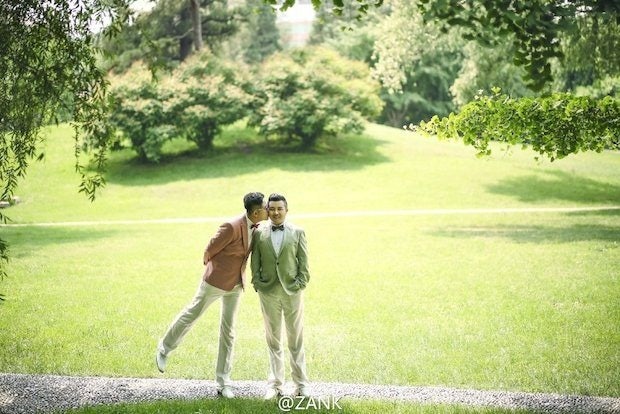
Jeff Hou, the founder of gay lifestyle platform Zank, and his partner Gino Chen married in Beijing after changing the location to avoid authorities. The difficulty of marrying in China is likely to encourage more same-sex couples to head to the United States to tie the knot. (Weibo/Zank)
On June 26, 2015, the U.S. Supreme Court ruled in a historic decision that the United States Constitution grants same-sex couples the fundamental right to marry, making same-sex marriage legal throughout the nation. Widely celebrated by the LGBT community and allies across the nation, the decision also sent a ripple effect around the world.
In China, shortly after news spread of the ruling, dozens of Chinese companies–among them Haier, Lenovo, Didi Dache, and Tmall–joined their U.S. counterparts in voicing support for the LGBT community through rainbow-themed ad campaigns or logo integrations. The news also started heated discussion among Chinese netizens on the subject of same-sex marriage, as well as strong interest from Chinese same-sex couples who themselves have hopes of getting married.
The day after the ruling, Jeff Hou, founder of China’s leading gay lifestyle platform Zank, married his partner Gino Chen in what they described as their “Big Gay Chinese Wedding” in Beijing. Despite having to change locations at the last minute due to police intervention, the wedding was attended by more than 200 guests and covered by Chinese news sites including iFeng.com.

The wedding between Jeff Hou and Gino Chen in Beijing. (Weibo/Zank)
While same-sex relationships among consenting adults are legal in China, same-sex marriage is currently not recognized by Chinese government. As more and more gay and lesbian Chinese choose to live openly and build committed relationships, many are looking beyond China’s borders to exchange their vows.
In June of this year, seven same-sex couples visiting from China, winners of the Alibaba-sponsored “We Do” online competition, tied the knot in a historic group wedding in West Hollywood. The wedding was officiated by West Hollywood Mayor Lindsey Horvath and widely covered by English and Chinese news outlets, among them the BBC, Los Angeles Times, The New York Times, and Baidu News, the news portal of China’s dominant search engine.
On the day of the U.S. Supreme Court ruling, the video of the group wedding and honeymoon in Los Angeles spread like wildfire on WeChat, attracting several million views. The following day, the Chinese travel healthcare service agency OutFamily launched a travel package targeted at Chinese same-sex couples hoping to get married in the United States.
Tourism marketers have long observed the economic impact of same-sex weddings. According to a study conducted by the Williams Institute in UCLA, once same-sex marriage is legal in all 50 states in the United States, a total of $2.6 billion per year could be generated through same-sex weddings and guest spending. This economic boost can lead to nearly $185 million in annual state and local tax revenue and support 13,058 jobs.

Rings at the wedding between Jeff Hou and Gino Chen in Beijing. (Weibo/Zank)
Out-of-town visitors are likely a key driver for such growth. According to data published by New York & Company, in the year after New York legalized same-sex marriage, 8,100 same-sex couples received marriage licenses in New York City, pumping $259.5 million into the local economy. In 50 percent of the same-sex couples who got married, at least one of the partners resided outside of New York City.
Twenty countries, including the United States, have legalized same-sex marriage nationwide. The United States is one of the few that do not require residency to acquire a marriage license. In popular gay travel destinations such as San Francisco, New York, and Los Angeles, same-sex couples can marry almost immediately after acquiring their marriage license. Such policies make it logistically more convenient—thus more feasible—for international couples to get married in the United States, making the country a more attractive destination than other markets.
China is already one of the largest tourism feeder markets for the United States. In 2014, 2.2 million Chinese traveled to the United States, a rise of 21 percent year-on-year. Figures should be even more impressive in 2015, boosted by the Obama administration’s policy to extend tourism visas for Chinese travelers to 10 years. (Making it easier than ever for Chinese travelers to visit the United States on repeated trips.)
The U.S. Supreme Court’s recent decision will no doubt send a welcoming message to same-sex couples in China who are increasingly open and vocal about their lifestyle. If U.S. destinations and brands can capture this opportunity and immediately start to engage this big-spending group, China’s estimated 40-70 million LGBT consumers could become a highly lucrative segment to drive new growth.
Charlie Gu is a director at China Luxury Advisors, as well as the organizer for the “We Do” wedding in Los Angeles. For questions about the “We Do” wedding and China’s LGBT market, please email charlie@chinaluxuryadvisors.com.
